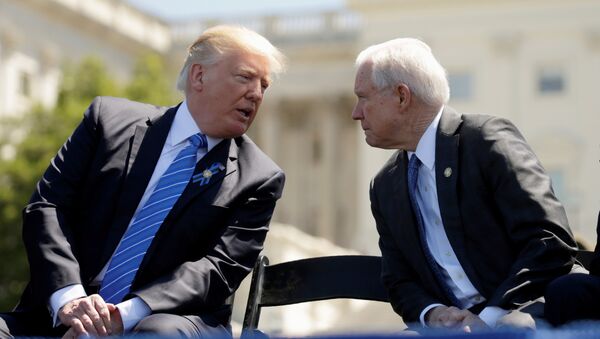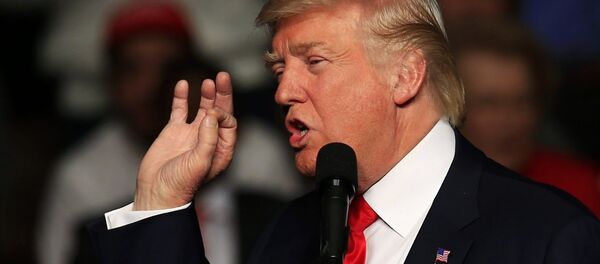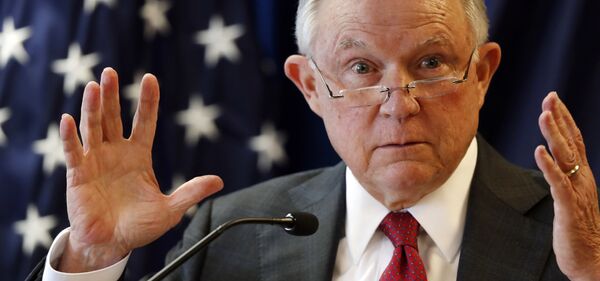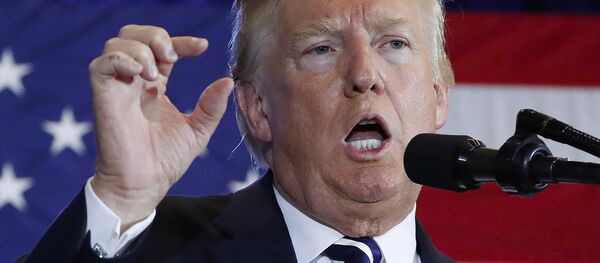Sputnik: How can these latest statements impact the already-strained relations between Trump and Sessions?
Alan Dershowitz: Well, first of all, I think it was improper for the president to criticize the attorney general for indicting Republicans on eve of the election. The justice department is supposed to be apolitical and completely neutral, and we don't want to have a president telling the justice department to indict Democrats but not to indict the Republicans, or if they're going to indict the Republicans to wait after the election. That, it seems to me, is an improper influence on the justice department.
READ MORE: 'Fix is In': Trump Close to Firing Jeff Sessions — Report
So we’re going to see this kind of thing until after the midterm elections, and at that point maybe we’ll see Sessions resign or the president fire him, and then we'll have a big controversy as to whether he did it in order to influence the investigation of himself.
Sputnik: Why hasn’t Trump fired the attorney general already if he’s that unhappy with him?
Sputnik: Who would be best placed to replace Jeff Sessions if he was to be replaced? And what kind of impact could it have on the Russian probe?
Alan Dershowitz: Almost half a century ago when Richard Nixon ended Watergate and when Gerald Ford became president, he picked the president of a university, the dean of a law school to become attorney general, somebody was non-political, non-partisan, somebody who had the respect of everybody in the United States, a man named Edward Levi, and that worked very, very well. Would Trump ever do that? I don’t think so, but he has to pick somebody who is above reproach. If he picks anybody who is seen as a crony or a partisan, I think it would be hard to even get some Republicans to confirm the nomination.
Sputnik: Now how can these disagreements that are currently happening at the moment impact on the upcoming midterm elections? Do you have a take on that?
Jeff Sessions was an early supporter of Trump, Trump nominated him and I think he thought he would be a perfect attorney general: loyal, experienced, somebody who is very much admired in the Senate, but then he recused himself and that came as a total surprise to the President and a blow.
I think the president has a point there, probably, Sessions should have told him before he got the job that if the Russia probe gets close to him he would have to recuse himself, and then I think the president never would’ve given him the job, he would’ve appointed somebody else, somebody who couldn’t recuse himself.
Sputnik: Some experts have noted that if Donald Trump does indeed fire Jeff Sessions it could be seen as an obstruction of the justice that could lead to the president's impeachment, what’s your take on that, is that really the case, is it an impeachable offense?
Alan Dershowitz: It is not, I’m categorical about that, and I wrote a book called "The Case Against Impeaching Trump" where I proved that in order for it to be an impeachable offense it has to be a crime. You can’t impeach a president for acting on his power under the constitution, and firing Sessions is within the power of the president.
In fact, an earlier president was impeached for firing a cabinet member, Andrew Johnson, and the Senate didn’t vote to remove him. I’m certain that firing Sessions would not possibly be an impeachable offense. Whether the Democrats, if they gain control of the House will impeach him is a political question, but constitutionally there would be no right to impeach him.
The views and opinions expressed in this article are solely those of the speaker and do not necessarily reflect Sputnik's position.





